Related Research Articles

The Moody Blues were an English rock band formed in Birmingham in May 1964. The band initially consisted of drummer Graeme Edge, guitarist/vocalist Denny Laine, keyboardist/vocalist Mike Pinder, multi-instrumentalist/vocalist Ray Thomas, and bassist/vocalist Clint Warwick. Originally part of the British beat and R&B scene of the early–mid 1960s, the band came to prominence with the UK No. 1 and US Top 10 single "Go Now" in late 1964/early 1965. Laine and Warwick left the band by the end of 1966, being replaced by guitarist/vocalist Justin Hayward and bassist/vocalist John Lodge. They embraced the psychedelic rock movement of the late 1960s, with their second album, 1967's Days of Future Passed, being a fusion of rock with classical music that established the band as pioneers in the development of art rock and progressive rock. It has been described as a "landmark" and "one of the first successful concept albums".

On the Threshold of a Dream is the fourth album by The Moody Blues, released in April 1969 on the Deram label. The album reached the top of the album charts, the group's first No. 1 album in the UK.

David Justin Hayward is an English musician. He was the guitarist and frontman of the rock band the Moody Blues from 1966 until that group's dissolution in 2018. He became the group's principal vocalist and its most prolific songwriter over the 1967–1974 period, and composed several international hit singles for the band.
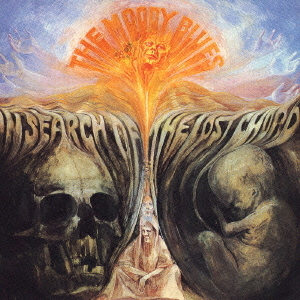
In Search of the Lost Chord is the third album by The Moody Blues, released in July 1968 on the Deram label.

To Our Children's Children's Children is the fifth album by the Moody Blues, released in November 1969.
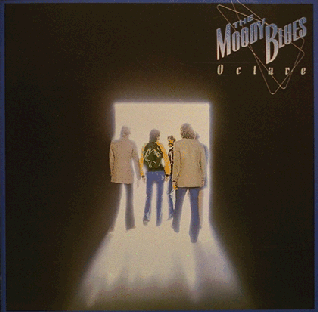
Octave is the ninth album by The Moody Blues, released in 1978, and their first release after a substantial hiatus following the success of the best-selling Seventh Sojourn in 1972. Released after a considerable break, which saw The Moody Blues returning in an era of punk music and disco, Octave produced a reduced commercial outcome for the band, but reached No. 6 in the United Kingdom and went platinum in the United States, where the album reached No. 13. The album produced the hit single "Steppin' in a Slide Zone", which hit No. 39 in the US, in addition to "Driftwood". The album's title is a musical pun: it references both the notion of an octave; and as a word derived from the Latin octavus it refers to this being the eighth album by this line-up of the Moody Blues.

Every Good Boy Deserves Favour is the seventh album by The Moody Blues, released in 1971. The album reached No. 1 on the British album chart, in addition to a three-week stay at No. 2 in the United States, and produced one top-40 single, "The Story in Your Eyes".

Raymond Thomas was an English musician, singer and songwriter. He was best known as a founding member of the English progressive rock band the Moody Blues. His flute solo on the band's 1967 hit single "Nights in White Satin" is regarded as one of progressive rock's defining moments. In 2018, he was posthumously inducted into the Rock and Roll Hall of Fame as a member of the Moody Blues.

Graeme Charles Edge was an English musician, songwriter and poet, best known as the co-founder and drummer of the English band the Moody Blues. In addition to his work with the Moody Blues, Edge worked as the bandleader of his own outfit, the Graeme Edge Band. He contributed his talents to a variety of other projects throughout his career. In 2018, Edge was inducted into the Rock and Roll Hall of Fame as a member of the Moody Blues.

"Voices in the Sky" is a hit 1968 single by the progressive rock band the Moody Blues, and it was written by their lead guitarist Justin Hayward. It was released as a single in June 1968, with "Dr. Livingstone, I Presume" on the B-side. It was later released on their 1968 album In Search of the Lost Chord, and was the first of two singles from that album, the other being "Ride My See-Saw".
"Legend of a Mind" is a song by the British progressive rock band the Moody Blues, and was written by the band's flautist Ray Thomas, who provides the lead vocals. "Legend of a Mind" was recorded in January 1968 and was first released on the Moody Blues' album In Search of the Lost Chord. Prominently featuring the Mellotron, it was the first song recorded for the album.
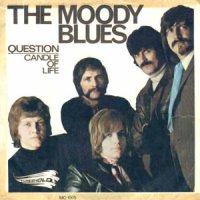
"Question" is a 1970 single by the English progressive rock band the Moody Blues. It was written by guitarist Justin Hayward, who provides lead vocals. "Question" was first released as a single in April 1970 and remains their second highest-charting song in the UK, reaching number two and staying on the chart for 12 weeks. The song reached number 21 on the Billboard Top 40 in the USA. It was later featured as the lead track on the 1970 album A Question of Balance. The single also features the song "Candle of Life" on its B-side, which was from the Moody Blues' previous album To Our Children's Children's Children.
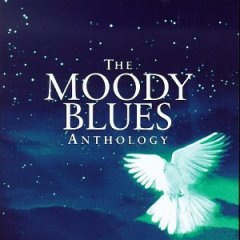
Anthology is a compilation album by the progressive rock band the Moody Blues. It was released in the US on 20 October 1998. It was not released in the UK until 2001 under the title The Collection with different artwork but with the same tracks as the US release.
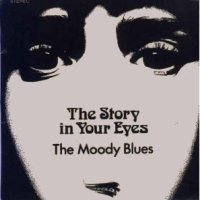
"The Story in Your Eyes" is a 1971 hit single by the English rock band the Moody Blues. Written by the band's guitarist Justin Hayward, it was first released as a single with "My Song" on the B-side, and then on the 1971 album Every Good Boy Deserves Favour shortly after.
"Dr. Livingstone, I Presume" is a 1968 song by the English rock band the Moody Blues. It was written by the band's flautist Ray Thomas, although he does not play the flute in the song. First released in June 1968 on the B-side of "Voices in the Sky," "Dr. Livingstone, I Presume" is one of Ray Thomas's signature child-themed songs, much like his first composition "Another Morning."
"Om" is a song by the British progressive rock band the Moody Blues that was released in July 1968 as the final track of their album In Search of the Lost Chord. It was composed by the band's keyboardist, Mike Pinder. "Om" has a heavy Indian influence and sound to it. The word "Om", which is chanted repeatedly throughout the song, represents Aum, a sacred mantra in the Hindu, Jain, Sikh and Buddhist religions.
"Visions of Paradise" is a 1968 song by the progressive rock band the Moody Blues. First released on their album In Search of the Lost Chord, it was written jointly by band members Justin Hayward and Ray Thomas, and was the first of many collaborations between them. The song is primarily led by Justin Hayward's voice and Ray Thomas's flute, with the lyrics describing the writer's perception of paradise.
"Gypsy (Of a Strange and Distant Time)" is a 1969 song by the progressive rock band the Moody Blues, from their album To Our Children's Children's Children, a concept album about space travel. The song was written by band-member Justin Hayward.

Michael Thomas Pinder is an English musician. He is a founding member and the original keyboard player of the rock group the Moody Blues. He left the group following the recording of the band's ninth album Octave in 1978. Pinder is especially noted for his technological contribution to music. In 2018, he was inducted into the Rock and Roll Hall of Fame as a member of the Moody Blues. He is the last surviving member of the group's original lineup.
"A Simple Game" is a 1968 song by the progressive rock band the Moody Blues. Written and sung by Mike Pinder, it was released as a non-album B-side to "Ride My See-Saw", a track from the album In Search of the Lost Chord. The song was produced by Tony Clarke and arranged by Arthur Greenslade. The track was covered by The Four Tops, and their version was issued as a single in the United States in January 1972, reaching #90 on the Billboard Hot 100. The song had already been issued as a single in Britain in September 1971, having reached #3 in the UK and #14 in Ireland.
References
- ↑ "In Search of the Lost Chord - The Moody Blues" – via www.allmusic.com.
- ↑ Fabbri, Franco (2017). "Binaurality, Stereophony, and Popular Music in the 1960s and 1970s". In Merrill, Julia (ed.). Popular Music Studies Today: Proceedings of the International Association for the Study of Popular Music 2017. Springer Fachmedien Wiesbaden. ISBN 978-3658177409.
- ↑ "AMORPHOUS ANDROGYNOUS - A MONSTROUS.... VOL 3". December 10, 2010.
- ↑ Chapman, Rob (17 September 2015). "The Moody Blues – psychedelia's forgotten heroes". the Guardian. Retrieved 23 March 2022.
- ↑ "Rumour". March 2, 1970 – via IMDb.